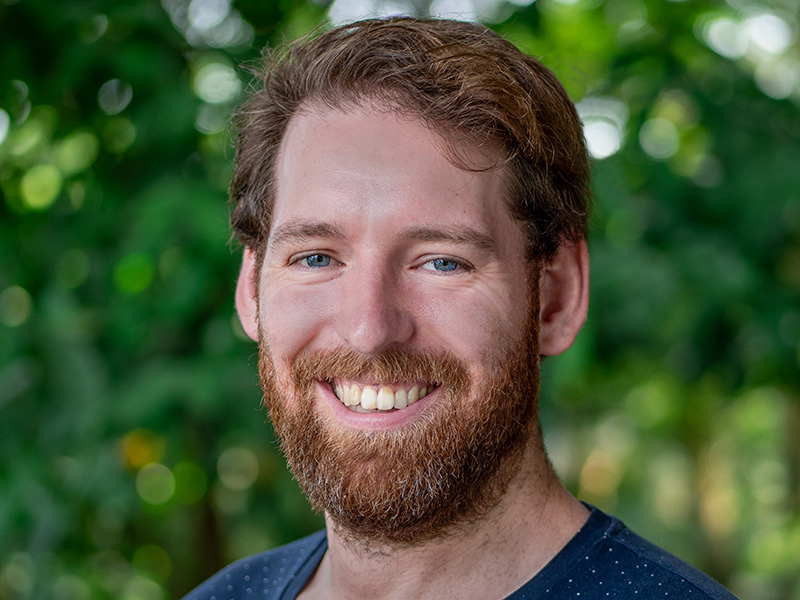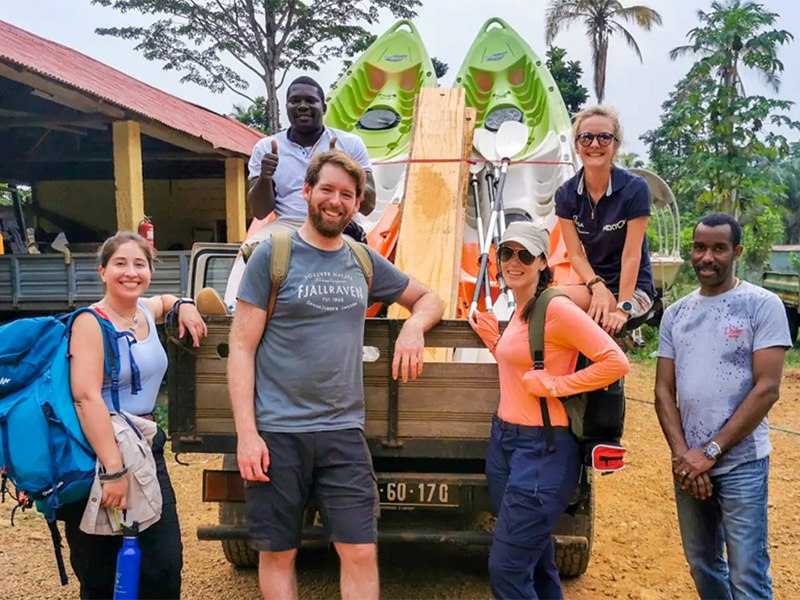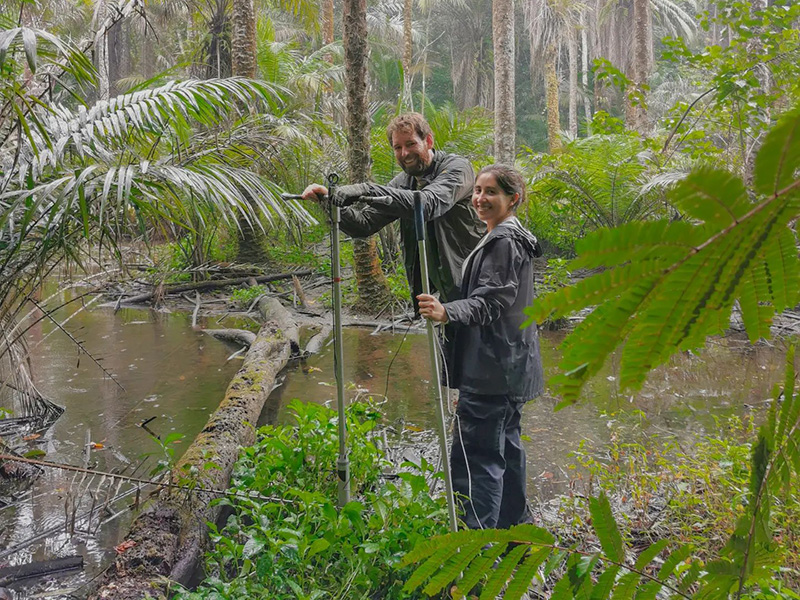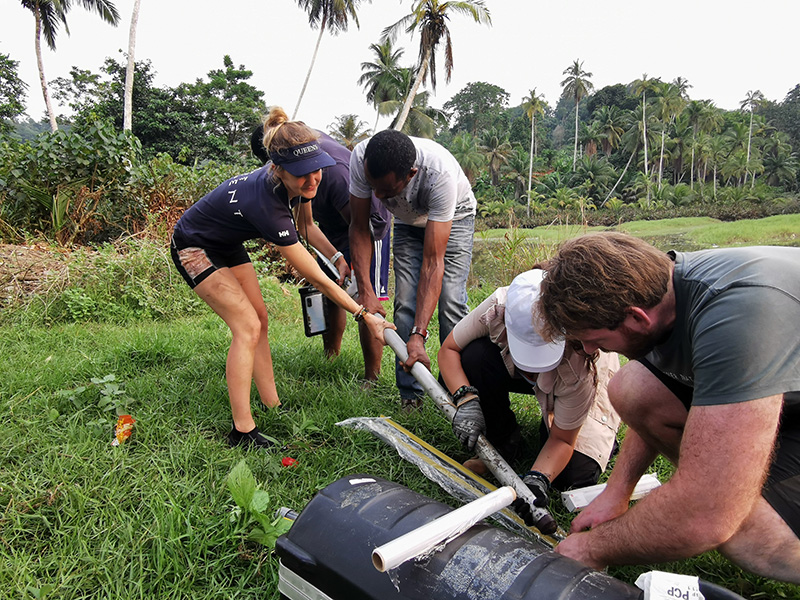
Bastiaan van Dalen, final-year SWW DTP PhD student in Environmental Archaeology and Sustainability at the University of Exeter, is currently on fieldwork in Principe island, a unique biodiversity hotspot off the coast of West Africa.
While I am exploring methodologies to study sustainability in past societies in the tropical forests of Latin America as part of my PhD research, I have also spent a lot of time over the past year with an academic team at the University of Oxford to set up a research project, Príncipe Past and Present, with the goal to study long-term dynamics of sustainability on São Tomé and Príncipe.
However, what was initially intended as a small side-project, has evolved into a full-fledged long-term multi-collaborative project, with exciting prospects for post-doctoral research opportunities.
Last December, I received a Placement Fund from the SWW DTP for this project that supported a four-person expedition to the island of Príncipe, part of the island state of São Tomé and Príncipe in equatorial West Africa.
Team members
Our team consists of myself and the other founders of Principe Past and Present:
- Bastiaan van Dalen (final-year SWW DTP, University of Exeter);
- Denise Swanborn (NERC DTP, University of Oxford);
- Carla V. Fuenteslópez (DPhil in Engineering Science, University of Oxford);
- Sophie Carlarne (Media Production Support Officer, University of Oxford).

Meet the team
Our goal is to bring to light historical trajectories of environmental change and understand contemporary human-environment interactions on possibly the most understudied biodiversity hotspot in the world.
São Tomé and Príncipe have remained geographically isolated, having never been connected to mainland Africa. This isolation has allowed for the evolution of unique endemic species that cannot be found anywhere else on earth, much like the Galapagos islands that inspired Darwin’s Theory of Evolution.
Despite their rich biodiversity, both islands remain relatively understudied, with Príncipe being particularly overlooked. In fact, it is even thought to be the only country in the world that has not yet seen any archaeological research. This is surprising because São Tomé and Príncipe present a particularly interesting case study due to the fact that the islands are thought to have been uninhabited until relatively recently; human settlement likely only started in the late 15th century when the Portuguese discovered the islands.
Humanity’s arrival on previously uninhabited islands can significantly change ecosystems. Although much of the vegetation and crops grown on Príncipe today were introduced from other parts of the world, it is unknown what the island’s original flora was like before humans arrived. As a result, it is difficult to assess how introduced species have impacted the island’s original ecosystems.

Forest exploration
In fact, next to nothing is known about how human activity on the island over the past few centuries has affected its environments in general. However, as one of the few places in the world without human presence throughout the distant past, Príncipe offers a unique opportunity to study these processes with an unprecedented level of detail. By reconstructing past ecosystems, we aim to uncover how human colonization and settlement has affected biodiversity over time and provide insights that are relevant to modern environmental management.
To answer these questions, we have been collecting sediment cores from open water bodies on Príncipe. During our surveys, we visited coastal lagoons and swamps at seven different locations around the island. To collect the samples, we used a sediment corer that we lowered into the water whilst standing on a raft, so as to not disturb the sediment below us.
Our analysis when we are back from the field will include checking for the presence of pollen, which can provide insights into the plant species that existed at different points in time. Combined with botanical surveys, these will allow us to build a picture of changes in vegetation and link these to human activity. Príncipe is a rocky volcanic island, so we weren’t sure if we would find good sediment basins. Thankfully our samples have been very promising!

Collecting plant samples
As well as documenting the unique biodiversity of Príncipe, we are interviewing local people to better understand the value of the natural environment to the people of Príncipe, as well as oral histories and views on sustainable development. These interviews will be at the heart of a short documentary to help tell the story of Príncipe’s human-nature connections, which will be submitted to national and international film festivals.
We’ve also made some interesting archaeological findings, including ceramics and building materials; this wasn’t a part of our original research aims but has the potential to guide future research into patterns of human settlement and links to the natural environment. As no archaeological research has been done on the islands yet, following up on that could be quite exciting.
Our supporters
We are very grateful to have support from a range of partners and collaborators, which among the SWW DTP include:
In the field, we have received in-kind support from the Belo Monte Hotel and Forever Príncipe for logistics, accommodation, and the use of a laboratory space as part of their ongoing research support activities.
Follow the expedition
Categorised in: Student Blogs